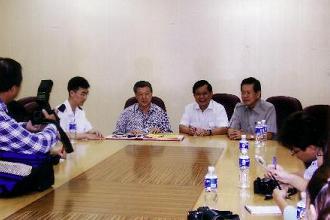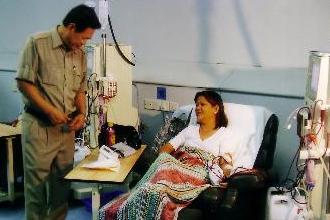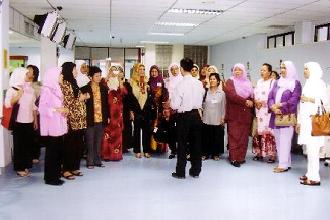Miri Red Crescent Dialysis Centre started the haemodialysis operation on 3 August 1996 with six
patients only. This year the centre has accept 37 new patients and as at 31 December 2006, we
have 137 patients with about 20 more new patients on the waiting list. The centre also had
visitor patients from Limbang, Lawas, Batu Niah, Bintulu, Kuching, Pulau Pinang, Brunei, Taiwan
and Canada.
This year the centre has buy another five new machines with a total of forty machines so far to
cater the increasing number of patients. The centre received an average of three new end-stage
renal failure (ESRF) patients every month and operate two shifts everyday from Monday to Saturday.
A kidney specialist, Dr. William Chau comes to the centre regularly to review all of our patients.
Training and development of staff and volunteers is the centre’s primary concern to ensure
efficient service.
What are the effect of kidney failure?
Asymptomatic chronic kidney failure (where the patient doesn't have symptoms yet) may be
discovered on routine examination by a doctor.
In kidney failure which is severe, practically every system of the body can be affected
and this causes many different types of symptoms.
Typical symptoms include loss of appetite, nausea and vomiting. There can be problems
that relate to anaemia such as shortness of breath on exercise and tiredness.
Patients can sometimes have disturbances of nerves, skin pigmentation and itchiness and
menstrual disturbances.
Furthermore other disease conditions can occur due to the kidney failure e.g. bone disease,
high blood pressure.
Each person has 2 kidneys and they found in the lower part of our back, one on each side. They are
partially protected by our ribs. The kidneys carry out many important functions in our body. What
do the normal kidneys do?
Cleaning function - This is a major function of the kidney. Microscopically, the kidney
actually contains thousands of filtering units (nephrons) which do the work of cleaning
the blood. It is able to remove waste materials which are produced by the body and these
waste materials are passed out in the urine.
Regulating function - The kidney is able to control the amount of different substances
in the body such as water and various salts and mineral.
Hormonal function - The kidney is involved in the production of some important hormones
(molecules which act as messengers) Erythropoietin is a hormone produced by the kidney
to stimulate the bone marrow to produce red blood cells. Red blood cells are important
for carrying oxygen to the cells of the body. The kidney also involved in the production
of a vitamin D hormone called calcitriol which has important effect on bone.
Patients with ESRF must have replacement of their kidney function by dialysis or transplantation.
Our centre only providing dialysis and the public donation is used to help the truly needy
patients. The centre can survive based only on the combination of payment by patient, public
donation and government subsidy. Patients are urged to pay their share of cost, otherwise the
centre will not able to provide treatments to all patients and some patients would have to
dialyze at elsewhere.
We are proud of the caring Mirian individuals, multi-national corporations, government and
non-government bodies who have continuously assisted in funding of the daily operation of our
community services. We wish to express our heartfelt thanks to all generous and caring public,
companies, organizations and foundations for helping us to keep our patients alive.
On behalf of our patients, we offer our heartfelt appreciation to all concern for the life-saving
support. The centre looks forward to serve the community to the best of its ability to make a
difference in the lives of those in need of this service.

Minister of Health, Datuk Dr Chua Soi Lek visiting MRCS Dialysis Centre

YB (DR) Lee Kim Shin talking to one of Dialysis patient |

Matron-matron visiting to Dialysis Hall |
|

